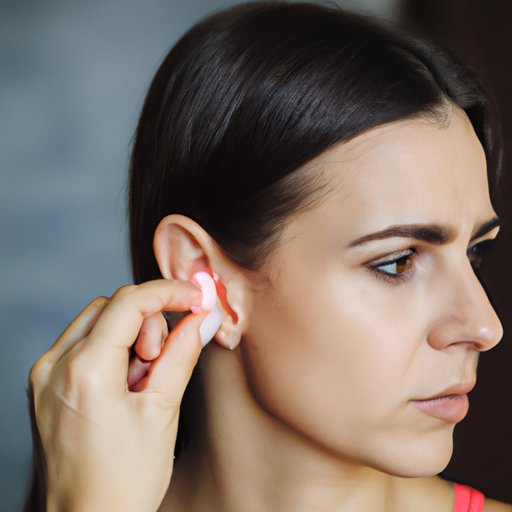
I. Introduction
Swimmer’s ear is a common outer ear infection caused by water that remains in the ear canal after swimming or bathing. If left untreated, it can lead to serious complications such as hearing loss and bone and cartilage damage. This article aims to provide the basic information, prevention tips, home remedies, medications, seeing a doctor, and proper ear cleaning techniques for swimmers ear.
II. Basics of Swimmer’s Ear
Swimmer’s ear is an infection of the outer ear caused by prolonged exposure to water trapped in the ear canal. The ear canal’s lining becomes inflamed, making it difficult for fluids to drain from the ear resulting in an infection. The most common symptoms are itching, pain, and a foul-smelling discharge from the ear canal. If left untreated, swimmer’s ear can lead to hearing loss and other serious complications.
III. Prevention of Swimmer’s Ear
Prevention is the best way to avoid swimmer’s ear. The use of earplugs while swimming, proper ear drying after swimming, and avoiding swimming in dirty or polluted waters can help prevent swimmer’s ear. Other tips include avoiding inserting objects into the ear canal such as cotton swabs and not wearing headphones or earbuds for long periods.
IV. Home Remedies for Swimmer’s Ear
Home remedies can help relieve the symptoms of swimmer’s ear. One of the most popular remedies is using a warm compress to help alleviate pain and reduce inflammation. Another home remedy is using garlic oil as it has antibacterial properties that can help treat the infection. Some people also use a combination of vinegar and rubbing alcohol to clean the ears, as it can help control and prevent the growth of bacteria.
V. Medications for Swimmer’s Ear
Medications for swimmer’s ear are available over the counter or by prescription. Over-the-counter nonsteroidal anti-inflammatory drugs (NSAIDs) can help relieve pain and inflammation. Ear drops with antibiotics are often prescribed to treat the infection and reduce inflammation caused by swimmer’s ear. It is essential to follow the instructions on the medication prescribed by your doctor to avoid further complications like an allergic reaction.
VI. When to See a Doctor
If the symptoms of swimmer’s ear persist after a week of self-treatment with home remedies, it is time to see your doctor. A medical professional may prescribe ear drops containing a stronger dose of antibiotics to control and cure the infection. Delaying getting treatment may worsen the symptoms, leading to a ruptured eardrum that can cause significant harm to your hearing and other tissues in the ear.
VII. Proper Ear Cleaning Technique
To avoid getting swimmer’s ear in the first place, proper ear cleaning is vital. Cleaning should be done with care, and it is best to avoid cotton swabs as they can push wax further into the ear canal and create the ideal environment for bacteria to grow. A tissue or cloth can be used to clean the outer part of the ear after showering or swimming. Cleaning should be done gently without using too much force to avoid damaging the ear or pushing wax further into the ear canal.
VIII. Conclusion
Swimmer’s ear is common among swimmers and individuals who spend extended periods in water. Swimmer’s ear can be prevented by taking measures like ear protection, drying ears after swimming, and avoiding swimming in dirty or polluted water. Home remedies like warm compresses and garlic oil and medication such as NSAIDs and antibiotics can help relieve the symptoms of swimmer’s ear. Seeking medical attention is vital if the symptoms persist after a week, and proper ear cleaning techniques should be practiced to avoid swimmer’s ear from developing.





